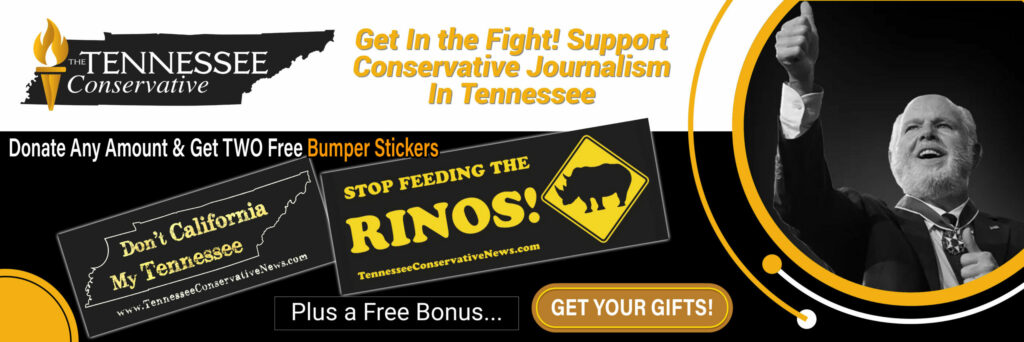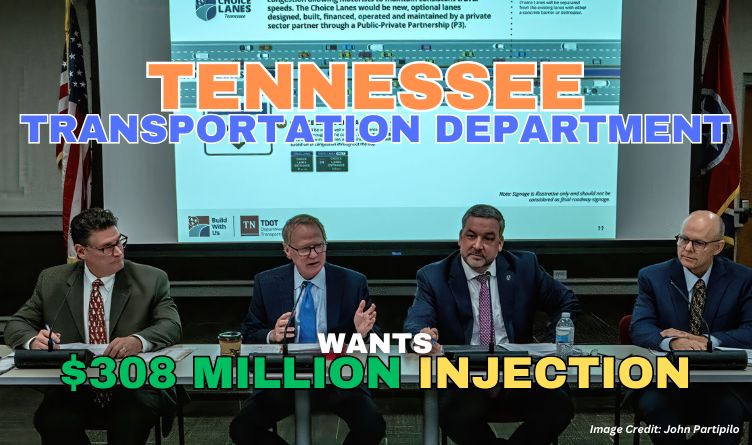Commissioner Butch Eley lays out plan to deal with backlog of projects amid a flat revenue stream.
Image: Tennessee Department of Transportation Commissioner Butch Eley, second from left, unveiling the first four toll lane projects proposed by the state at a December 2023 press conference. Eley is asking for an additional $308 million in his department’s budget. Image Credit: John Partipilo
By Sam Stockard [The Tennessee Lookout -CC BY-NC-ND 4.0] –
Facing a weak revenue outlook, the Tennessee Department of Transportation is requesting $308 million more from the state budget to keep up with the growing cost of maintenance and construction.
It’s a situation Gov. Bill Lee labeled as “sobering” and a “compelling challenge.”
Tennessee has some of the nation’s top highways, Lee said, “yet we have a backlog of funding for projects that need to be done in order to keep our roads the best in the country.”
The Republican governor made the statement after Transportation Commissioner Butch Eley and his staff introduced a plan to add $100 million in recurring expenses and $200 million in non-recurring costs for fiscal 2025-26. Those include $125 million for highway paving, $75 million for bridge maintenance, $20 million for safety, $50 million in non-recurring funds for statewide road funds for low-interest loans to local governments, $10 million for litter collection and mowing, $9 million for employee salary and benefits increases and $16.7 million to expand the state’s roadside help program.
The department benefited from the state’s Transportation Modernization Act two in 2023 to the tune of $3 billion for major projects in the state’s largest cities and $300 million for aid to counties. Yet the state’s road system is under stress because of growth and the need for a better maintenance program, officials said.
“It’s a balancing act,” Eley told the governor during the Election Day budget hearing.

Eley said the law that passed in 2023 allowed a new work process that enabled the state to move quickly on repairs to roads destroyed by Hurricane Helene. The state still has some 600 employees trying to make roads passable in upper East Tennessee where large swaths were hollowed out and left in rubble by the stormwater.
The state also is embarking on its first public-private “toll” lane project, planning to take bids in 2025 and start work in 2026 on an elevated highway from Nashville to Interstate 840 near Murfreesboro.
The department’s planned increase for a total budget exceeding $2.4 billion would come with a proposed $602 million for repairs, $454 million from the federal government for resurfacing and bridge repair.
Federal money for the department is expected to increase $23.8 million to $1.4 billion in fiscal 2025-26, which starts next July 1. Yet state revenue is expected to dip $42.3 million to $1.28 billion, leaving the state in a $12.3 million lurch.
Transportation officials are projecting flat user fee revenue amid rising construction costs, which are up about 100% since 2021. The state depends heavily on fuel taxes for revenue, but those aren’t producing enough money to continue improving roads and bridges.
The sluggish outlook is accompanied by a business tax break that is hurting the state’s overall revenue this year, already causing it to rebate nearly $865 million.
Democrats recently launched a drive called “Rocky Top, not Rocky Roads” to push the Republican supermajority to spend more on transportation to fix potholes and relieve traffic congestion. They were to pay for billboard messages in strategic locations.
The lawmakers accuse Republicans of ignoring deteriorating roads and mass transit development and allowing transportation projects to hit a $34 billion backlog. The Department of Transportation estimates urban motorists are losing $989 a year because of traffic delays and greater fuel consumption.
State Rep. Aftyn Behn, an East Nashville Democrat, said the state needs to amend its “pay-as-we-go” philosophy because it limits the state from investing in large-scale projects by forcing the state to fund projects without borrowing and pushing costs higher.
Democrats also say they want the state to work with local governments on regional mass transit such as light rail to extend the life of roads and cut the number of vehicles on highways.
House Democratic Caucus Chairman John Ray Clemmons said, “It’s telling that Gov. Lee considered TDOT’s budgetary request for $308 million ‘sobering’ and refuses to even have a ‘serious conversation’ about our state’s outdated transportation funding model while $144 million sits in state coffers collecting dust to pay for a voucher scam that will ultimately bankrupt our state and defund public schools statewide.”





One Response
This is a perfect case in point that the TN Republicans need to listen to the Democrats on issues as well. Privatizing public roads is a BAD idea. It is one that is part of globalization, it has been proven detrimental to citizens, and it is not new. A 30-year international study proves that: http://www.world-psi.org/en/publication-why-public-private-partnerships-dont-work. Our grassroots organization is introducing this to our legislators and will write on it after determination on who is in the committees handling this in 2025.